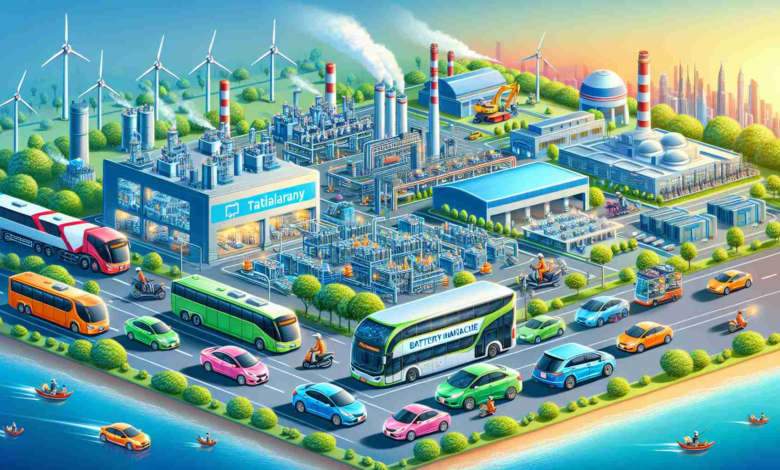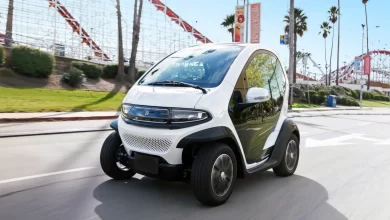Thailand Steers Towards Electric Vehicle Mastery with Complete Battery Manufacture

Summary: Energy Absolute has embarked on a far-reaching initiative to produce lithium-ion batteries within Thailand, reinforcing the nation’s aspirations to become a central figure in the electric vehicle (EV) industry. Their strategic direction, geared towards self-reliance, includes a 4 gigawatt-hour capacity target by 2025 and a focus on domestic production aimed to address the increasing demands for electric commercial vehicles, paving the way for future international expansion.
Thailand is setting a course for innovation in the electric vehicle (EV) sector as Energy Absolute, a renewable energy pioneer, announces a full-cycle production of lithium-ion batteries. This marks a crucial step in Thailand’s path towards becoming an influential player in the global EV market. The initiative aligns with the Thai government’s policies and showcases the nation’s commitment to strengthening its industrial capabilities to meet both domestic and future international needs.
As the first company in the ASEAN region to establish a battery ‘gigafactory,’ Energy Absolute’s comprehensive strategy is a testament to Thailand’s focused efforts on increasing self-reliance. Despite the hurdles in acquiring the necessary raw materials, the company remains undeterred in its quest to drive up production capacity in service of Thailand’s flourishing electric bus industry, with an anticipated milestone of reaching a 4 gigawatt-hour production feat by 2025.
This ambitious project goes beyond mere battery production. Energy Absolute is expanding its horizons to manufacture a wide array of electric commercial vehicles, including buses, trucks, ferries, and an upcoming EV tugboat. For now, the domestic market consumes the majority of its output, which strategically positions the company for sustainable growth and a cohesive transition to international markets later on.
The EV industry’s path is laden with obstacles, among them being the strenuous task of procuring raw materials, erecting necessary infrastructure, and emerging as a competitive force in the global EV arena. Nonetheless, statistical analyses by firms like BloombergNEF reflect a burgeoning interest in electric vehicles, with substantial growth projected in the ensuing years. The International Energy Agency (IEA) further substantiates this positive outlook with detailed market assessments and regulatory guidelines.
Conclusively, Energy Absolute’s proactive measures herald significant strides in positioning Thailand as a key protagonist in the EV industry narrative. With expectations set high, both regionally and globally, these undertakings may forge an era of unprecedented growth and revolutionary advancements in the EV landscape, affirming Thailand’s commitment to securing a vanguard role in the sphere of electric vehicles.
Thailand’s Electric Vehicle Industry Outlook
Thailand’s daring push into the EV industry propelled by Energy Absolute’s initiative to produce lithium-ion batteries showcases the country’s ambition to establish itself as a serious contender in the electric vehicle sector. This aligns with the broader market trends where demand for EVs is soaring globally. Market forecasts indicate a compound annual growth rate (CAGR) of around 22.6% from 2019 to 2026, according to Allied Market Research.
The focus on electric commercial vehicles such as buses and trucks taps into a segment that is critical for reducing urban pollution and transforming public transportation systems. As the market for EVs expands, there are concerns regarding the sustainable sourcing of raw materials, such as lithium, cobalt, and nickel, which are vital for battery production. Further complexities include the challenge of scaling up production, ensuring robust supply chains, and maintaining cost competitiveness against traditional internal combustion engine vehicles.
In the context of market readiness, the infrastructure for supporting EVs, including charging networks and service centers, is pivotal. The Thai government’s role in creating favorable policies and incentivizing EV adoption will be crucial for the industry’s growth. Alongside local demand, export opportunities to nearby countries could become a significant growth driver once domestic capacities are established.
The shift towards electrification also intersects with Thailand’s renewable energy targets, opening possibilities for integrating EVs with smart grids and renewable energy sources. If successful, Energy Absolute’s initiatives could herald a more extensive regional push for similar investments, positioning ASEAN nations as emerging centers for EV production and innovation.
For those seeking more information on the EV market and its trajectory, resources like the International Energy Agency (IEA) offer comprehensive insights and guidelines for the energy sector. Additionally, Bloomberg New Energy Finance (BloombergNEF) provides market analyses and forecasts that can help stakeholders understand emerging trends and opportunities within the EV industry.
Through strategic investment and with an eye on both domestic and international markets, Energy Absolute’s endeavors may signal the beginning of a new chapter in EV manufacturing within Thailand, contributing substantially to the nation’s economic landscape and playing a pivotal role in the global shift towards sustainable transportation solutions.

Roman Perkowski is a distinguished name in the field of space exploration technology, specifically known for his work on propulsion systems for interplanetary travel. His innovative research and designs have been crucial in advancing the efficiency and reliability of spacecraft engines. Perkowski’s contributions are particularly significant in the development of sustainable and powerful propulsion methods, which are vital for long-duration space missions. His work not only pushes the boundaries of current space travel capabilities but also inspires future generations of scientists and engineers in the quest to explore the far reaches of our solar system and beyond.



